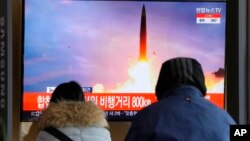North Korea launched an intermediate range ballistic missile early Sunday, according to South Korea’s military, Pyongyang’s longest-range missile test in over four years.
South Korea’s military said the North Korean missile was launched at a steep angle from the northern province of Jagang — flying 800 kilometers but reaching a maximum altitude of about 2,000 kilometers.
Japan’s government, which also tracks North Korea’s launches, provided similar figures, adding the missile flew for about 30 minutes.
Those statistics indicate a so-called “lofted trajectory” that can allow North Korea to test longer-range missiles without overflying their neighbors.
Many defense analysts said the test may have involved a missile such as the North's Hwasong-12, which has a range of 4,500 kilometers.
“It matches pretty closely [with the Hwasong-12],” Melissa Hanham, an affiliate with the Stanford Center for International Security and Cooperation, told VOA. “Of course, we can’t rule out something with a similar flight profile. Without any more info it’s a good bet.”
North Korea typically does not announce its launches until its state-run newspapers are published the following morning.
If confirmed, it would be the longest-range missile North Korea has tested since 2017, when it launched two intercontinental ballistic missiles during the height of tensions between North Korean leader Kim Jong Un and former U.S. President Donald Trump.
It is the 11th North Korean missile launched this month, setting a new monthly record.
In a statement, the U.S. military’s Indo-Pacific Command condemned the test and called for North Korea to refrain from further destabilizing acts.
In response to the latest launch, Japan and South Korea held urgent sessions of their national security councils.
In a statement, South Korean President Moon Jae-in condemned the launch as a violation of United Nations Security Council resolutions. The test, he said, takes North Korea a step closer toward making good on its threat to abandon its voluntary suspension of longer-range missile tests.
North Korea's missile frenzy appears at least partly aimed at pressuring the United States and South Korea amid an extended pause in nuclear talks. North Korea has several other possible motivations for testing missiles, including shoring up domestic political support for leader Kim Jong Un, ensuring the performance of new weapons and demonstrating deterrence.




